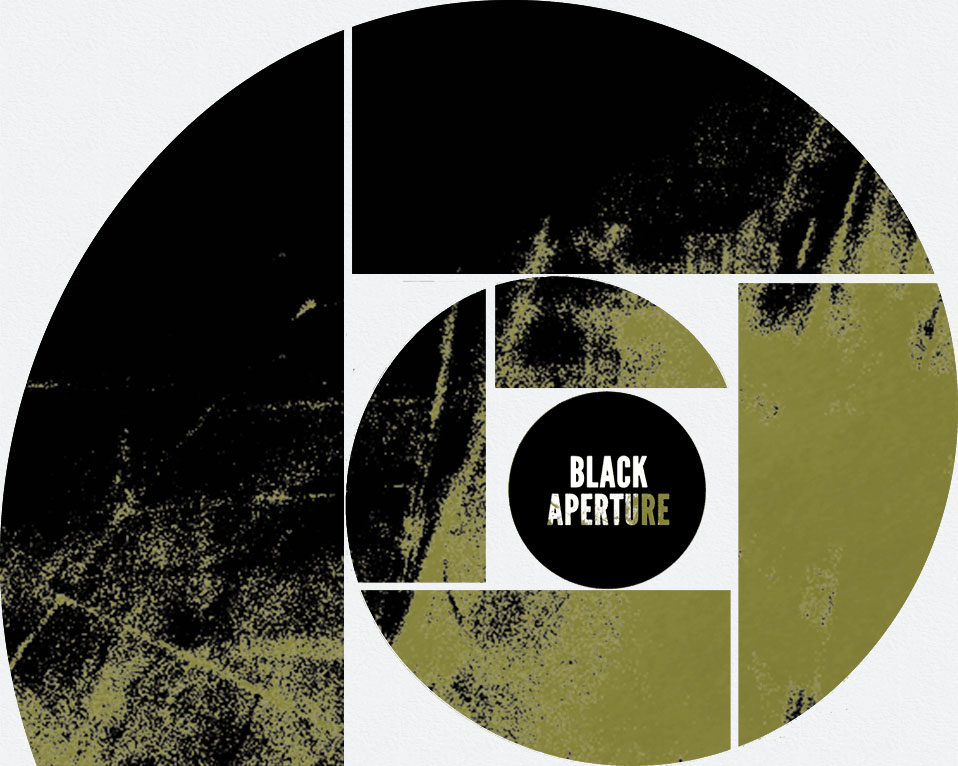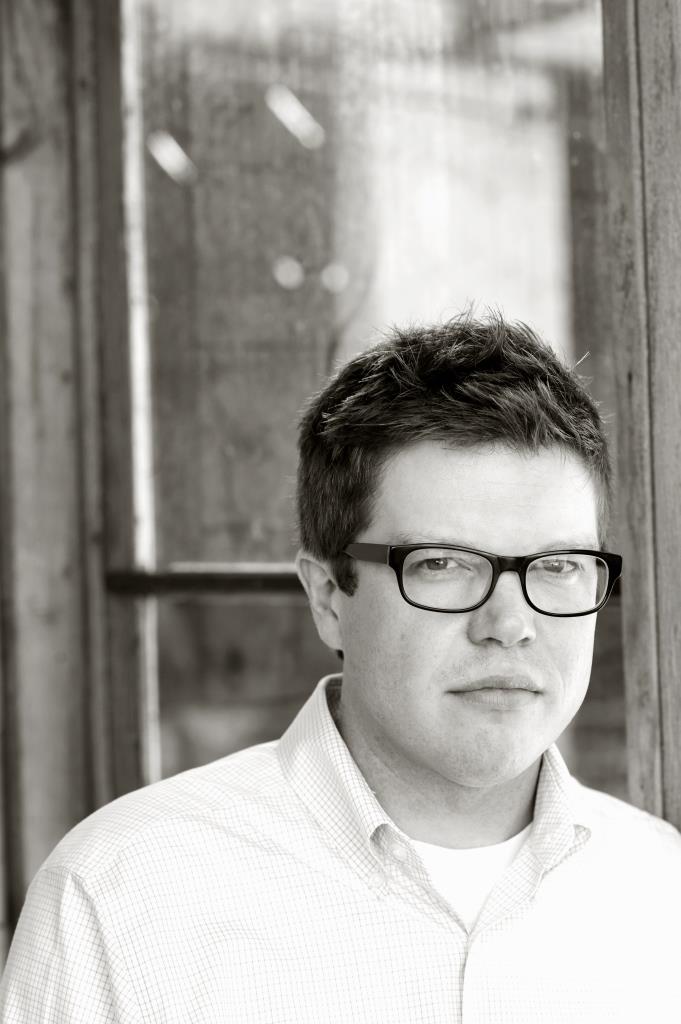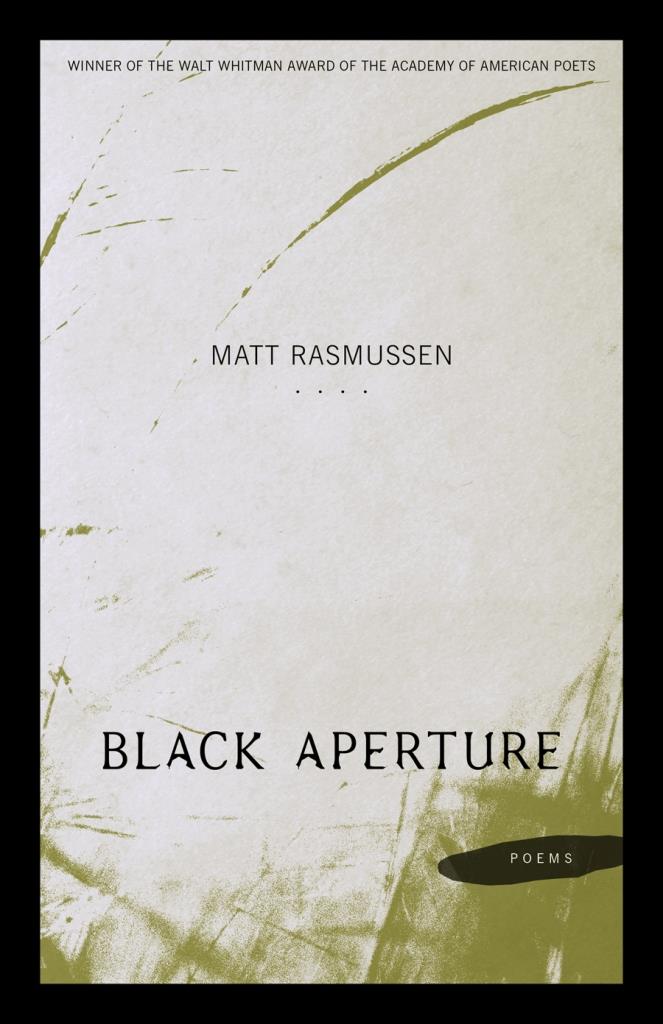Lovely Meeting Places for Terrible Pain
National Book Award finalist Matt Rasmussen's genius with language and image is sufficient to turn even impossibly painful subject matter into fiercely honest and deeply resonant poetry.



Slender, spare, and fierce, the 32 poems in Black Aperture comprise Matt Rasmussen’s first full-length collection. Shortly he will travel to New York City to attend the National Book Awards ceremony, because this book is a finalist for that prize. This kind of critical reception for a first book is highly unusual. So, what are these poems about? Jane Hirshfield says it plainly: “The subject is the suicide of his brother.”
It may be that you aren’t sure you can (or wish to) read about something so distressing; there are three separate poems, for instance, with the same title, “After Suicide.” It’s true that the collection burns through layer after layer of self-protection. But at the same time, the power of the writing itself, Rasmussen’s gift for metaphor, and his own courage, take an impossible subject and create a book that will astonish you, as you place your trust in it.
The first section of Black Aperture begins with a poem called “Trajectory.” Here it is in full:
Trajectory
After spiraling twice it exits the barrel, the spent day exposing a flame that propels it. The bullet, spinning to maintain a shallow arc, carves a hot thread through the wind until it breaks one hair and the deer’s neck splashes open. Before the heart beats the bullet unfolds a plowing lead point then again is in flight wobbling from its passage through the deer. Its peeled-back body comes to rest in the soft trunk of a poplar to stick out like a button. When I press it all the leaves fall.
What is immediately clear is Rasmussen’s extraordinary ability to create layered, resonating, almost cinematic images–the ending simile, for example, swift and sure. Even the macabre vision of a bullet “wobbling from its passage/through the deer” is an essential element of this close, hard look, this honest examination, this exceptional specificity. The emotional content of the last line is delivered through image alone.
Black Aperture has its own trajectory, foreshadowed in this opening poem. A bullet carves a hot thread through the coming pages. But it is a thread that also stitches everything together.
It’s exhilarating to encounter such arresting imagery, and a vision with such power and coherence, even when the content is disturbing. “The entire meadow/burned until it was black/as a parking lot.” “It felt/a river moving under the ice/like a rope through a frozen glove.” Rasmussen is from International Falls, which has to be either the worst place or the best place for a poet to grow up. “The paper mill glugs/tan clouds into the twilight.” Or these lines:
Far away a loon’s call-- the whistle of a knife through water--bounces off the house-sized white stone. A remnant of what the glacier ate before it died.
There are dozens of such examples throughout the book. The most affecting of these, which is both horrifying and deeply moving, is (and here we just have to follow where Rasmussen bravely takes us) the hole that the fatal bullet made in his brother’s head. Here, in full, is the second poem in the book:
After Suicide
A hole is nothing but what remains around it. My brother stood in the refrigerator light drinking milk that poured out of his head through thick black curls down his back into a puddle growing larger around him. My body stood between the living room and kitchen one foot on worn carpet one on cold linoleum. He couldn’t hear his name clouding from my mouth settling in the fluorescent air. I wanted to put my finger into the hole feel the smooth channel he escaped through stop the milk so he could swallow it but my body held as if driven into place. The milk on the floor reflected the light then became it. Floated upward and outward filling every shadow blowing the dark open.
The imagery here is surreal, spellbinding, and the impact is devastating.
Rasmussen returns to the festering image of the bullet hole in several subsequent poems. From “Elegy in X Parts”:
Do not open the tiny door in the back of your head. All alone when all alone, we are asleep inside our murderers.
Most stunning are these lines from the third and final poem entitled “After Suicide,” in which the dead brother shows up at a party, and to entertain people…
you put a flashlight into your mouth and turn it on. On the wall behind you, a coin of light hovers like the miniature sun a magnifying glass makes. Your head’s a projector showing the movie of your death.
This frightful hole is many things: a door, a movie projector, the moon (or its opposite, the sun), the place his brother escaped through. It’s also the black aperture.
Some of the power of this collection comes from what Rasmussen omitted. First, like all good poets, he left out everything mediocre, wordy, or flabby. Even though the one thing we want to know is why — why did his brother shoot himself? — the poems do not have the answer, and do not speculate. The book is cathartic for readers who have known suicides, heard of suicides, been devastated by suicides. Here we are, in Minnesota of all places, speaking of the unspeakable.
Poetry is the right genre for this. Intensity and compression are its hallmarks; images are the tools of the imagination, and poems are, as Tomas Transtromer said, “meeting places.” In poetry, the soul finds a voice. I was in the audience a few years ago when Matt Rasmussen read some of these poems, and after people got over the shock of hearing such searing language about such a deeply personal and horrific subject, a concentrated calm took hold, and during a short question and answer period after the reading, people found they had a great deal in common with Rasmussen and each other. We have all been touched by suicide (remotely, if we are lucky), and wondered how it is that some people want to live so much that they will do anything, even when it’s not rational, and some, often those with the most promise, want the opposite, especially when it’s not rational.
Maybe this book is not possible, but here it is anyway. It’s not an amusement, even though Rasmussen is clever (“Monet as a Verb,” for instance). These aren’t poems that hold readers at a distance, or create a persona, or struggle to manufacture an impact from trivia, or exploit their subject. It didn’t even “have to be written.” Nothing has to be written.
What is it then? It’s a collection of poems that tell us, in language charged with almost reckless honesty and excruciating accuracy, how Matt Rasmussen was finally able to say, in the final poem, “I have come to terms/with my brother’s suicide.” If he hadn’t such a genius with language and image, then yes, the book would be impossible. Instead, it’s unforgettable.
Related links and information: Black Aperture (Louisiana State University Press, 2013), Matt Rasmussen’s debut collection of poems, is the winner of the 2012 Walt Whitman Award and a finalist for the 2013 National Book Award for poetry. The winners for this year’s National Book Awards will be announced at a ceremony on November 20, 2013. For more about and by the poet, visit his website: http://mattrasmussen.net/.